#Cite. St. Pierre
Explore tagged Tumblr posts
Text
The Judo Argument book review

Debates about whether God exists have raged for ages and probably always will. Such arguments typically play out in philosophy and theology. However, some reason from a scientific perspective - employing findings about the natural world to argue for divine origins. These "judo arguments” attempt to beat science at its own game, citing laws and evidence to make a faith-based case. While novel, they universally come up short when scrutinized scientifically.
A common argument notes that complex life could not have evolved randomly, as entropy dictates decay toward disorder. Thus, intentional intelligent design must be involved. However, Earth isn’t a closed system – the Sun provides ample energy for local organizing processes to emerge so long as net universal entropy increases. Another argues that amino acids forming the first proteins randomly would be astronomically unlikely. However, while a precise protein repeating by chance is unlikely, some self-replicating molecule arising eventually becomes probable - and selection could amplify it.
The Ontological Argument: Defining God Into Being One of the earliest scientific arguments for God's existence is the "ontological argument" put forward by St. Anselm in 1078. His reasoning goes that the very concept of a perfect being implies its existence since non-existence would be an imperfection. This argument attempts to define God into existence through logic, without the need for evidence. While inventive for its time, modern philosophers largely reject it as unsupported semantic trickery. As sci-fi author Asimov notes with humor in his essay titled “The Judo Argument,” conceiving even a “perfect gas” does not necessitate its physical existence in reality.
Thermodynamics and the Improbability of Order A more common judo argument invokes the second law of thermodynamics, which holds that entropy or disorder universally tends to increase in closed systems. The case goes that evolution's drive towards greater order and complexity over billions of years appears to violate this. Thus, intentional intelligent design must be involved to circumvent random decay. However, Asimov adeptly counters that Earth isn’t a closed system – the Sun provides ample incoming energy to facilitate local organizing processes so long as net entropy increases in the larger solar system. Just as a refrigerator can stay cold inside by releasing more heat to its surroundings, life can self-organize additional order so long as there is an external energy gradient to exploit.
Probability Calculations and the Origins of Life In his 1947 book "Human Destiny," French biophysicist Pierre Lecomte du Noüy calculates the absurdly low probability that the amino acid chains forming the first proteins could have been linked by pure chance random interactions within the lifetime of Earth. He presents this tiny probability as persuasive evidence for intentional divine design seeding life. Asimov admits the odds of randomly hitting on an exact known protein are infinitesimal. However, his rebuttal shows that while likely amino acid combinations are still insufficient to spark replication, some variability remains probable. Thus, once any self-copying molecule like RNA eventually forms by chance, mutation, and selection can take over to bridge the gap from chemistry to evolutionary biology. This incremental bootstrapping pathway is now supported by decades of origin of life experiments, rather than necessitating one impossibly unlikely jackpot molecule.
Order Emerging Spontaneously from Chaos While Asimov stops short of any definitive statements on God’s existence either way, his systematic take-downs of such arguments rooted in shaky logic demonstrate the awesome power of emergent order possible from chaotic physical and chemical laws alone. Contrary to Creationist doctrine, complexity does not imply an intelligent Creator. In Asimov’s model grounded by evidence, life proliferates not despite, but precisely because of, the organizational trends intrinsic to dynamic non-equilibrium thermodynamic systems with sufficient energy flows. Those seeking an honest assessment of how far science can go in engaging with faith will find “The Judo Argument” a thought-provoking and enlightening read. More broadly, it highlights the wonder, chance, and self-organization built into nature that allowed humankind to eventually emerge and ponder such eternal questions - no deities required.
The March of Science Towards Natural Explanations Over the centuries, phenomena once cited definitively as proof of divine influence - from lightning to human origins to disease treatment - have consistently yielded to natural scientific explanations rather than legitimizing supernatural ones. While gaps remain in our knowledge, the march towards material and empirical causes continues unabated. Those hoping science will reach its limits and endorse intentional explanations are invariably disappointed. Today mysteries like consciousness, dark matter, and the spark of life draw those seeking transcendence for what science has yet to explain. But theories are already emerging of these grounded in complex feedback loops, exotic particles, and energetic chemistry alone, without any need for external souls, creators, or vital energies.
Can Science and Religion Ever Be Reconciled? While judo arguments fail to leverage science to demonstrate the intent behind life’s emergence, the impasse between scientific and spiritual worldviews persists. They operate in separate spheres concerning very different kinds of questions - the mechanical how versus the numinous why. Asimov gives reason for optimism by engaging deeply with the science cited rather than dismissing it outright, respecting religious conviction even while disputing faulty logic. In that spirit of mutual respect for evidence and belief, the relationship between science and philosophy might finally leave behind centuries of tension. Just as interdisciplinary research unifies micro and macro fields, more grace-filled profound dialogues between leading thinkers pursuing different facets of truth may continue to relieve friction and enlighten humankind.
The Judo Argument: Wrestling with Science and Faith In his thought-provoking book "The Judo Argument," author Shoaib Rahman examines several longstanding attempts to use science to definitively prove the existence of God. He dubbed these "judo arguments" - when believers try to flip science's logic against itself to argue for supernatural explanations from a rational perspective.
Order Emerging from Chaos
Many such arguments hinge on the claim that complex structures like the human eye could not have evolved randomly or that the spark of life itself beating the odds is too improbable without guidance. However, as Rahman points out, the second law of thermodynamics only probabilistically favors increased entropy rather than strictly mandating it. With ample external energy sources like the Sun, locally reversing entropy through organizing processes that ultimately enable life is not unlikely over billions of years.
Probability Statistics Misapplied
In perhaps the book's most compelling chapter, Rahman unpacks the fallacies in prominent creationist probability calculations. While authorities cite the infinitesimal chances of proteins or DNA chains forming exactly as they exist today spontaneously, he notes this is the wrong comparison. The first self-replicating molecules would likely be far simpler, adapting later by evolutionary processes. Moreover, while any given outcome is very unlikely, some outcome proving viable is still probable - especially with chemical building blocks already extant.
When Statistics Fail Philosophy
Yet at its heart, Rahmansympathetically explains these arguments stem from cognitive gaps left unsatisfied by reductionist science. Statistical improbabilities argued as necessitating guidance disguise deeper existential grappling. But just as dividing accident from intent may provide comfort, 'God' often inserts higher questions rather than answers. Neither statistics nor semantics can capture the whole of reality. By revealing judo arguments' overreliance on these tools, Rahman shows how they fail philosophy before even reaching faulty science.
A Reasonable Path Forward
While cataloging gaps in past efforts, Rahman notably stops short of conclusively disproving God, remaining open to new evidence. He simply shows the folly of attempting proof, either way, advocating humility. Within those wise constraints, his dismantling of shaky logic sympathetic to the motivations provides a blueprint for more constructive dialogues between science and faith. For non-believers, it unpacks assumptions reflecting existential angst. For believers, it respects faith's convictions while avoiding easily falsifiable scientific extrapolations in tension with theology's teachings.
By showcasing judo arguments' inadequacies with both evidence and meaning, Rahman's "The Judo Argument" charts a reasonable path forward for reconciling the compatibility questions haunting science and religion’s conflicted past. Perhaps their interplay can yet offer mutual illumination of both immanent and transcendent mysteries. But crudely wielding each against the other proves nothing, clarifies little, misses the point entirely, and impoverishes all parties. This book provides helpful guideposts to move that stalled conversation into more enlightened territory.
2 notes
·
View notes
Text
Pyrenees
June 4 25
THE PYRENEES AGAIN
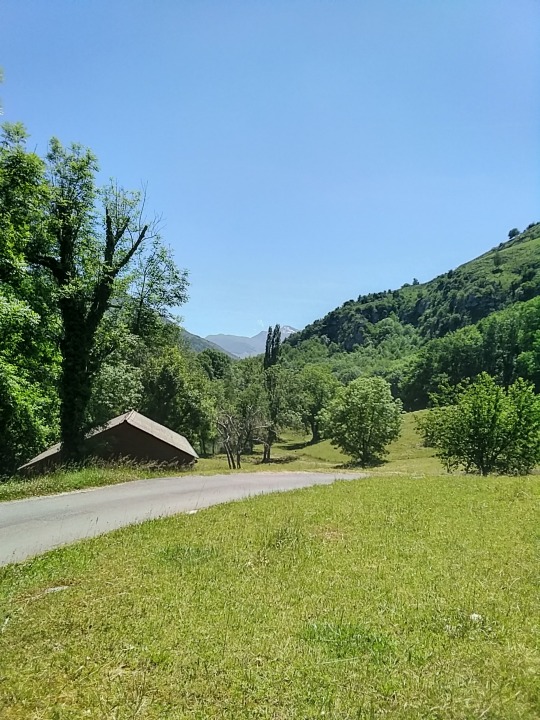
Blog by Lynne Pearl
By some miracle we went again and the mountains were all as I had remembered for a whole year. They give hope and beauty to the soul. They are everlasting beautiful and the air up there is like diamonds and the light is like all the rainbows put together and made crystal. Up there it is just a heaven for everyone. We go there and forget everything because it all does not seem so big anymore and we are just so happy to be there.

The stories are there. the trees are there and that magnificent river, turquoise and drawn from glaciers high up but nearby, just pummelling through the town and the domaine. And always there is the singing of many people, they must all be happy to be here.
Then at night as night falls, they all are coming together with small lights but moving together, singing in unison, all helping one another along until they come together in the big square in rows to sing some more.

We went one day to St Sauvin, where there was a magnificent old village church built like a fairly tale castle with a witch’s hat, sitting at the head of the biggest valley you have ever seen so that in every direction you look there are mountains, mountains and more mountains. There is no world other than mountains, black and very far away tipped with pearly white.

Then another day following we visited Cite St Pierre, created so that everyone should be able to come to visit here. We sit beside the lake which has that quality of perfect light and shines like a mirror. There are water lilies too and you can now walk around the lake and climb half way upa small mountainside before cascading yourself down beyond steep fields full of mountain flowers like a coverlet of glory. And always in the background those mountains, very far away, very high up and glistening in black and a golden light so that you wanted to reach up and just touch them they are so close by.
0 notes
Text
A hardened sinner is saved from hell thanks to a small remnant of Marian devotion
Pierre Le Gouvello, lord of Kériolet, was a Breton penitent born in Auray on July 14, 1602, who died in the odor of sanctity in 1660. He was ordained a priest on March 28, 1637. He transformed his château into a hospice for the poor.
Born in Auray on July 14, 1602, into a wealthy noble family, Pierre de Keriolet seemed to be in the grip of the devil from childhood. He loved doing evil. His studies with the Jesuits in Rennes didn't help, on the contrary. Always short of money, he stole from those around him.
At the age of twenty, he tried to join the Ottoman Empire to become a Muslim. But obstacles stood in his way, and he never succeeded. He fell victim to brigands while crossing Germany: the only survivor of the attack, he implored Our Lady of Liesse to save him. Granted his wish, he did not keep his promise and, for over fifteen years, led a debauched life, during which he may have signed a pact with the devil.
In 1635, he returned to France to collect his father's inheritance, and bought a position as councillor at the Parliament of Brittany. He used his power as a magistrate to foster hatred between litigants, taking satisfaction in doing evil.
On several occasions, he escaped death, as if an invisible, all-powerful protection were extending over him. Instead of reflecting on this, he congratulated himself on his exceptional good fortune.
In the hope of being noticed by the young Duke of Orléans, brother of Louis XIII, Pierre de Keriolet accompanied the latter to Loudun in 1636, along with other members of parliament. A case of witchcraft was rocking the town. During an exorcism in the church of the Holy Cross in Loudun, the devil, speaking through the mouth of the possessed woman, publicly called out to Pierre de Keriolet, revealing who had protected him and explaining the reasons for this, citing the miracles of protection from which he had benefited. In closing, the devil made it clear that he was there to take him to hell, shouting, “If it hadn't been for her and your angel, I'd have taken you away!”
The next day, the devil exclaimed on seeing Keriolet again: “Well, here's the gentleman from yesterday again! If he keeps on like this, he'll rise as high in Heaven as he would have sunk with us in Hell. Ah, if you only knew! [...] She put her arms in the mire up to her elbows to pull him out of his filth, just because he still had a tiny bit of devotion left for her! And to think we're ourselves are damned for one sin!!!”
In fact, Keriolet was saved for having, all his life and whatever his faults, kept the promise he had once made to his mother: to say a Hail Mary every day, come what may, in honor of Our Lady. Although he was renowned for his avarice, he always gave generously in alms, even if he claimed it was not for the love of God. But “almsgiving covers the multitude of sins”, in the words of St Gregory the Great.
Keriolet eventually became a priest. He continued to experience demonic attacks for the rest of his life, as hell hates to let go of its prey, but it was all in vain. You can't take from Our Lady what is rightfully hers.
Anne Bernet, Author of over forty books, most of them devoted to sanctity
1000raisonsdecroire.com
Hail, Mary, full of grace, the Lord is with you; blessed are you among women, and blessed is the fruit of your womb, Jesus. Holy Mary, Mother of God, pray for us sinners now and at the hour of our death. Amen.
0 notes
Text
Antonio Velardo shares: Louisiana Public School Principal Who Punished Student for Dancing Apologizes by Claire Moses
By Claire Moses Jason St. Pierre cited religion to discipline a 17-year-old for what he deemed inappropriate dancing at an off-campus Homecoming after-party. Published: October 12, 2023 at 07:48PM from NYT U.S. https://ift.tt/zQkWlgq via IFTTT

View On WordPress
0 notes
Text
Walker High School Principal Apologizes for Punishing Student for Dancing
Jason St. Pierre cited religion to discipline a 17-year-old for what he deemed inappropriate dancing at an off-campus Homecoming after-party. source https://www.nytimes.com/2023/10/12/us/student-punished-dancing-louisiana.html
View On WordPress
0 notes
Text
Liselotte's Favourite Childhood Christmas

Liselotte von der Pfalz, Duchess of Orléans, with her two children Philippe and Elisabeth Charlotte, whom she wanted to experience the same Christmas festivities as she did as a child, c. 1678–1679 by Pierre Mignard.
A merry Christmas to all of you who celebrate (and of course an equally happy day to everyone who is currently celebrating a different holiday or none at all)!
Do you know that feeling of being nostalgic for the time when Christmas was a magical, festive season rather than a busy rush of obligations, get-together and worrying about presents, food and keeping all the relatives happy? You're not alone in that.
This year's Christmas post comes straight from the 17th century: on 11 December 1708, the Duchess of Orléans, more commonly known as Liselotte to her friends, family and posterity, recounted the magic of her favourite childhood Christmas, the last she spent in Hannover with her aunt Sophie (in the year 1660, I believe; Liselotte would have been 8 years old), to her daughter. Luckily, we still have the letter:
Ich weiß nicht, ob ihr auch jenes andere Spiel kennt, das man in Deutschland immer noch pflegt; man heißt es das Christkindl; dabei richtet man die Tische wie Altäre her und legt für ein Kind alle möglichen Sachen darauf, neue Kleider, Silber, Seidenbänder, Puppen, Naschereien und alles mögliche. Auf die Tische stellt man Buchsbäume, und auf jedes kleine Ästchen steckt man eine kleine Kerze: das sieht ganz wunderhübsch aus. [...] Ich erinnere mich, wie man in Hannover das letzte Mal das Christkindl zu mir kommen ließ: Man hat Schulbuben kommen lassen, die recht ordentlich eine Komödie spielen. Als erstes kommt der Stern und dann der Teufel und die Engel und schließlich der heilige Christ mit Petrus und den anderen Aposteln. Der Teufel schilt die Kinder und liest eine lange Liste mit ihren Untaten vor. Darauf sagt der Christ, daß er gekommen ist, sie zu beschenken, aber weil sie so böse sind, könne er nicht bei ihnen verweilen. Der Engel und der heilige Petrus bitten für sie und versprechen, daß sie sich bessern werden. Da vergibt Christus ihnen, und der heilige Petrus und der Engel führen sie zu den Tischen, die für sie bereitet sind [...]. Und als der heilige Petrus mich bei der Hand nahm -- es war ein kleiner Schuljunge mit einem falschen Bart --, da sah ich, dass er Krätze hatte, und daran merkte ich den Schwindel. [...] Und ganz bestimmt freue ich mich noch heute daran."
I don't know if you know that game which is still being maintained in Germany and called Christkindl [Christ Child]; they dress the tables, one for each child, in the style of an altar, and put all manner of things onto them, such as new clothing, silver, silk ribbons, dolls, sweets and much else. Onto the tables, they put little box trees, and on each little branch they place a little candle; it all looks very beautiful. I recall how they had the Christkindl visit me for the last time in Hannover: They had schoolboys come to act in a rather amusing comedy. At first, the star arrives, and then the devil and the angels and at last Christ with St. Peter and the other apostles. The devil scolds the children and reads a long list of their misdeeds to them. To this Christ replies that he has come to give them presents, but since they are so naughty, he cannot stay. The angel and St. Peter plead for them and promise that they will be good. Christ forgives them and St. Peter and the angel lead them to the tables which have been arranged for them [...]. And as St. Peter took me by the hand -- he was a little schoolboy with a false beard -- I remarked that he had scabies and saw through the sham. And without a doubt it still brings me joy until this day."
Sadly, this was to be the last Christmas of this sort Liselotte ever celebrated; her father, notoriously stingy to the point of arguing with his son's school at Heidelberg to lower the lunch fees citing poor young Karl's meagre appetite, was not one to indulge in grand festivities and when in France with children of her own, Liselotte, intent on bringing this favourite childhood tradition back for her own son and daughter, met with resistance from her husband. In a letter dated to January 1711 to Sophie von Hannover, the beloved aunt in whose home she had celebrated this favourite Christmas:
"hir weiß man gar nichts davon; wolte es introduciren, allein Monsieur sagte: 'Vous nous voulés donner de vos modes Allemandes pour faire de la despence, je vous baisse les mains'."
"They don't know nothing of it here; I wanted to introuce it, but Monsieur said 'You want to give us your German fashions [just to] create expenses, I kiss your hands."
So, young Philippe and Elisabeth Charlotte d'Orléans sadly never experienced the things that had made their mother's childhood Christmasses special, most crucially, they never had a Christmas tree, which would not arrive in France until after WWI.
To some degree, Liselotte's Christmas still exists materially; we know Christmas trees, presents still look very much the same, and there are holiday-themed plays both secular-ish and classic nativity plays put on by children, albeit luckily with a less harsh moral undertone.
But what's perhaps the most important, contrary to Philippe d'Orléans's fear of overspending is the aspect is to pass the joy of the festivities on, and share it with others because in the end, what's more precious than all the new clothes, silver, silk ribbons, dolls and sweets are the happy memories of the day.
Quotations taken from: Dirk Van der Cruysse: Madame sein ist ein ellendes Handwerck. Liselotte von der Pfalz. Eine deutsche Prinzessin am Hof des Sonnenkönigs (1995), 4th edition 1997, p. 85 f.
#liselotte von der pfalz#philippe d'orléans#philippe ii d'orléans#elisabeth charlotte d'orléans#history#christmas#17th century
14 notes
·
View notes
Text
An Oakland, California, community is in shock after repeatedly seeing groups of suspected prostitutes and human trafficking victims reportedly soliciting outside a Catholic grade school.
"I get the call saying – 'Mr. Gallo, I can't get into my home because the pimp is blocking my driveway,'" Oakland City Councilman Noel Gallo told ABC 7 of the weekly calls he receives from residents in East Oakland. "It's constant."
The Oakland Police Department is beefing up patrols outside St. Anthony's K-8 Catholic school after parents and school leaders sounded the alarm on the young, scantily-clad women and girls they see walking near East 15th Street in Oakland.
Last week, ABC 7 reported that as parents arrived at the grade school on Monday morning, a suspected prostitute was already near the school, apparently soliciting right in front of the school’s gate. However, the scene is not uncommon.
CALIFORNIA PROSTITUTION LAW ALLOWS SEX ABUSE TO 'RUN RAMPANT' IN LOS ANGELES STREETS, VICTIM ADVOCATES WARN
"It's every day, during all periods of the day," local mom Rosa Vargas told the outlet.
Vargas said the women are typically wearing skimpy outfits, even sometimes naked, and often standing right in front of the gate of the school. Pimps have even followed Vargas down the street on a couple of occasions, she said.
NATIONWIDE PUSH TO LIBERALIZE PROSTITUTION LAWS PROMPTS CONCERNS ABOUT HUMAN TRAFFICKING
Nearby International Boulevard has long been plagued with prostitution and other crimes, but construction on East 12th Street has pushed the prostitutes into residential neighborhoods, ABC 7 reported.
Some of the girls are only 15 or 16 years old, according to Gallo, which has set off concerns of human trafficking.
"We've seen up to 20 women walking up and down this street," Gallo said. "Young, young girls."
TEXAS HIGH SCHOOL TEACHER, YOUTH PASTOR AMONG NEARLY 50 ARRESTED IN PROSTITUTION STING: 'SCOURGE OF THE EARTH'
Rodney Pierre-Antoine, who oversees a network of local Catholic elementary schools, including St. Anthony’s, said police are left in a tough spot to take care of the situation, citing a recently-enacted bill that prohibits officers from arresting people on the suspicion of prostitution.
"Their hands are somewhat handcuffed," said Pierre-Antoine.
The bill, authored by Democratic state Sen. Scott Wiener, was aimed at protecting transgender women who Wiener said are disproportionately targeted by police. The law took effect on Jan. 1.
Local police have since sounded off that the bill prevents them from rescuing young girls who have been trafficked, ABC 7 reported.
POLICE: FLORIDA HIGH SCHOOL STUDENT LED PROSTITUTION RING
"That is absolutely dead wrong. SB 357 has been in effect for 30 days, this problem has been around a lot longer. So I think it's a cop-out frankly for the police to say this law, which is brand new, is preventing them from doing anything," Wiener told ABC7 when asked about concerns from police.
After the outlet reported concerns over human trafficking and prostitution near a school, the FBI said it will install additional surveillance cameras in the area, according to Gallo. An official with the FBI added in a comment to ABC7 that the suspected trafficking might be gang related.
"In many large cities you have places that's called the stroll or the walk, this is where the transaction is taking place," said Robert Tripp, the special agent in charge for the FBI's San Francisco division.
"Usually the trafficker and the person in charge are one in the same," Tripp said. "This crime depends so much on the relationship between the abuser and the victim. It's a very compact chain of command."
TEXAS CPS EMPLOYEE FIRED AFTER ALLEGEDLY TELLING 14-YEAR-OLD GIRL TO BECOME A PROSTITUTE
Sources told the outlet that the FBI already picked up one 13-year-old girl off of East 15th Street.
Gallo said he accompanied police on a ride-along to witness the prostitution and saw a van with Nevada plates roll into the area early in the morning and leave at night.
"When I was out on the street with police on a ride-along, I saw the van pull up and I saw license plates from Nevada. They were being brought up from outside Nevada... I saw five, six girls get out of the van," Gallo said.
"Eight o'clock in the evening, I saw them all get back into the van, drive on, and we followed them and they went on the freeway and went on," said Gallo.
Fox News Digital reached out to St. Anthony’s school, the FBI, the Oakland PD, and Wiener on Monday morning but did not immediately receive replies for additional comment.
6 notes
·
View notes
Text
A Journey Into French Cinema By Susan King

Do you remember the movie or filmmaker that changed your life? When you realized film was more than entertainment? When you were moved so emotionally that you couldn’t shake the feeling you had when watching the movie? Veteran French filmmaker Bertrand Tavernier, who directed such acclaimed films as THE CLOCKMAKER OF ST. PAUL (‘74); COUP DE TORCHON (‘81) and ‘ROUND MIDNIGHT (‘86), was just a boy when he fell in love with the films of such directors as Jacques Becker and Jean Renoir.
Their films gave him “tremendous emotion,” he told me in a 2017 interview for the American Cinematheque. “Tears and love. Because of them, I think, I understood my country. I think I fell in love with France because of those films. Not because of politicians, but because of Renoir, because of Claude Sautet, because of Marcel Pagnol.”
In 2016, he directed a valentine of a documentary, MY JOURNEY THROUGH FRENCH CINEMA. It’s a must-see for French film fans, as well as those who are just dipping their toes into the country’s cinema. The documentary looks at the works of Becker and Renoir, as well as Jean-Pierre Melville, Claude Sautet, the writer-director team of Jacques Prevert and Marcel Carne and the pioneering New Wave filmmakers Francois Truffaut and Jean-Luc Godard.
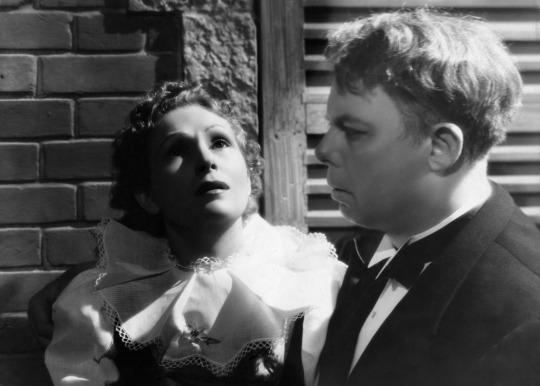
“The main reason I decided to do the film is that I wanted to say, ‘Thank you’ to all of those people who changed my life,” noted the 79-year-old Tavernier. “I mean those directors, screenwriters, composers, actors and actresses. Some of those films gave me hope, gave me strength. You know there is a Chinese proverb which says that when you drink the water of the well, you must always thank the man who built it.”
Jean Renoir (1894-1979) didn’t build French cinema, but he was definitely one of the chief architects. The son of renowned Impressionist painter Pierre-Auguste Renoir, he is considered one of the greatest, if not the greatest, French filmmaker of the 20th century. He was also one of the most influential with the New Wave directors because he was what the New Wave considered an auteur, a filmmaker who exerts his personal influence and artistic control so that he is considered the author of the movie.
Renoir made countless classic films both in France and in the U.S., where he fled when the Nazis took power of his country. Renoir earned his only Oscar nomination for Best Director for THE SOUTHERNER (‘45). But two of his greatest accomplishments are LA GRANDE ILLUSION (‘37) and THE RULES OF THE GAME (‘39). LA GRANDE ILLUSION, which was released in the states in 1938, was the first foreign language film to earn a Best Picture Oscar nomination and the New York Film Critics Circle Award for Best Foreign Film.

Set during World War I, LA GRANDE ILLUSION is a powerful anti-war statement as well as a look at the class structure in France. Renoir’s frequent collaborators, superstar Jean Gabin, Marcel Dalio and Pierre Fresnay, play three French officers who are captured and sent to a POW camp run by an aristocratic German commander played Erich von Stroheim. Though critics often have cited THE RULES OF THE GAME as Renoir’s masterpiece, I prefer GRANDE ILLUSION because he imbues his characters with empathy and sympathy.
THE RULES OF THE GAME opened 91 years ago this month in France, just a few months before the German occupation. Audiences, especially the wealthy, didn’t want to see this film as it satirized the ruling class. Renoir would later say that he tried to salvage the film by cutting it, “and to start with, I cut scenes in which I myself played too large a part, as though I was ashamed, after the rebuff, of showing myself on screen. But it was useless.” Renoir was figuratively bound and quartered by French audiences for RULES OF THE GAME because it skewers the aristocracy. The rich and spoiled have no morals bounding in and out of each other’s arms and beds during a hunting weekend at the country estate of a wealthy marquis (Dalio). The scene of the rabbit hunt is horrific, as these frivolous beings kill countless defenseless animals trying to escape their rifles. And the estate’s staff and workers are equally amoral.
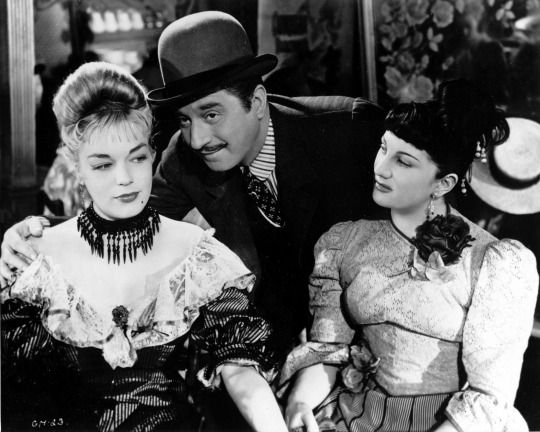
The only character who has heart is Octave played by Renoir, a big bear of a man who is “friends” with the aristocracy but in the end is really alone. THE RULES OF THE GAME only stayed in theaters for three weeks and was actually banned as “demoralizing.” The shortened version did play in the country after World War II, but it wasn’t until 1956—when two French lab technicians found over 200 boxes with bits and pieces of the cut material— that the film restored to its originally glory.
In 1999, a The Village Voice poll placed it as the second-best film of the century after Citizen Kane. During the 1930’s, Jacques Becker (1906-1960) was an assistant to Renoir. And just as Renoir, he was very much admired by the New Wave. Truffaut once wrote that Becker “is an intimate and realistic filmmaker who is in love with verisimilitude and everyday realities.” Tavernier described Becker as “the finest French filmmaker of the ’40 and ‘50s the most even in quality, the smartest in his choices.”
Among his acclaimed films are the gangster noir TOUCHEZ PAS AU GRISBI (1954), starring Gabin, and the taut prison escape drama LE TROU (1959). But his loveliest, most emotional film is CASQUE D’OR (‘52), starring Simone Signoret, as the mistress of a ruthless gangster (Claude Dauphin), who falls passionately in love with a reformed ex-con (Serge Reggiani). Though it’s telegraphed early that their love affair will end tragically, it’s so well-acted, compelling and even suspenseful. Signoret won the BAFTA honor for Best Foreign Film Actress.

Early in his career, Tavernier worked with Jean-Pierre Melville (1917-1973), who was a mentor to the New Wave directors and was best known for his superb almost minimalist film noirs including BOB LE FLAMBEUR (‘56), LE DOULOS (‘62), LE SAMOURAI (‘67) and LE CIRCLE ROUGE (‘70). Tavernier notes in MY JOURNEY THROUGH FRENCH CINEMA that Melville was a bully, having squabbles with his actors and would also dress down his crew in front of everybody.
“That was a nightmare for me,” he told me. “When I was coming to work, I was sick. I was young. It was demanding, as frightening as school. It’s only later on the set of other directors that I discovered the atmosphere was not like that. That doesn’t change anything about the talent of Melville, but he created an atmosphere which was frightening, especially for a young kid like me.”
#French films#french new wave#bastille day#Jean Renoir#jean pierre melville#TCM#Turner Classic Movies#Susan King
114 notes
·
View notes
Photo

A Journey Into French Cinema By Susan King Do you remember the movie or filmmaker that changed your life? When you realized film was more than entertainment? When you were moved so emotionally that you couldn’t shake the feeling you had when watching the movie? Veteran French filmmaker Bertrand Tavernier, who directed such acclaimed films as THE CLOCKMAKER OF ST. PAUL (‘74); COUP DE TORCHON (‘81) and ‘ROUND MIDNIGHT (‘86), was just a boy when he fell in love with the films of such directors as Jacques Becker and Jean Renoir. Their films gave him “tremendous emotion,” he told me in a 2017 interview for the American Cinematheque. “Tears and love. Because of them, I think, I understood my country. I think I fell in love with France because of those films. Not because of politicians, but because of Renoir, because of Claude Sautet, because of Marcel Pagnol.” In 2016, he directed a valentine of a documentary, MY JOURNEY THROUGH FRENCH CINEMA. It’s a must-see for French film fans, as well as those who are just dipping their toes into the country’s cinema. The documentary looks at the works of Becker and Renoir, as well as Jean-Pierre Melville, Claude Sautet, the writer-director team of Jacques Prevert and Marcel Carne and the pioneering New Wave filmmakers Francois Truffaut and Jean-Luc Godard.“The main reason I decided to do the film is that I wanted to say, ‘Thank you’ to all of those people who changed my life,” noted the 79-year-old Tavernier. “I mean those directors, screenwriters, composers, actors and actresses. Some of those films gave me hope, gave me strength. You know there is a Chinese proverb which says that when you drink the water of the well, you must always thank the man who built it.” Jean Renoir (1894-1979) didn’t build French cinema, but he was definitely one of the chief architects. The son of renowned Impressionist painter Pierre-Auguste Renoir, he is considered one of the greatest, if not the greatest, French filmmaker of the 20th century. He was also one of the most influential with the New Wave directors because he was what the New Wave considered an auteur, a filmmaker who exerts his personal influence and artistic control so that he is considered the author of the movie. Renoir made countless classic films both in France and in the U.S., where he fled when the Nazis took power of his country. Renoir earned his only Oscar nomination for Best Director for THE SOUTHERNER (‘45). But two of his greatest accomplishments are LA GRANDE ILLUSION (‘37) and THE RULES OF THE GAME (‘39). LA GRANDE ILLUSION, which was released in the states in 1938, was the first foreign language film to earn a Best Picture Oscar nomination and the New York Film Critics Circle Award for Best Foreign Film.Set during World War I, LA GRANDE ILLUSION is a powerful anti-war statement as well as a look at the class structure in France. Renoir’s frequent collaborators, superstar Jean Gabin, Marcel Dalio and Pierre Fresnay, play three French officers who are captured and sent to a POW camp run by an aristocratic German commander played Erich von Stroheim. Though critics often have cited THE RULES OF THE GAME as Renoir’s masterpiece, I prefer GRANDE ILLUSION because he imbues his characters with empathy and sympathy. THE RULES OF THE GAME opened 91 years ago this month in France, just a few months before the German occupation. Audiences, especially the wealthy, didn’t want to see this film as it satirized the ruling class. Renoir would later say that he tried to salvage the film by cutting it, “and to start with, I cut scenes in which I myself played too large a part, as though I was ashamed, after the rebuff, of showing myself on screen. But it was useless.” Renoir was figuratively bound and quartered by French audiences for RULES OF THE GAME because it skewers the aristocracy. The rich and spoiled have no morals bounding in and out of each other’s arms and beds during a hunting weekend at the country estate of a wealthy marquis (Dalio). The scene of the rabbit hunt is horrific, as these frivolous beings kill countless defenseless animals trying to escape their rifles. And the estate’s staff and workers are equally amoral.The only character who has heart is Octave played by Renoir, a big bear of a man who is “friends” with the aristocracy but in the end is really alone. THE RULES OF THE GAME only stayed in theaters for three weeks and was actually banned as “demoralizing.” The shortened version did play in the country after World War II, but it wasn’t until 1956—when two French lab technicians found over 200 boxes with bits and pieces of the cut material— that the film restored to its originally glory. In 1999, a The Village Voice poll placed it as the second-best film of the century after Citizen Kane. During the 1930’s, Jacques Becker (1906-1960) was an assistant to Renoir. And just as Renoir, he was very much admired by the New Wave. Truffaut once wrote that Becker “is an intimate and realistic filmmaker who is in love with verisimilitude and everyday realities.” Tavernier described Becker as “the finest French filmmaker of the ’40 and ‘50s the most even in quality, the smartest in his choices.” Among his acclaimed films are the gangster noir TOUCHEZ PAS AU GRISBI (1954), starring Gabin, and the taut prison escape drama LE TROU (1959). But his loveliest, most emotional film is CASQUE D’OR (‘52), starring Simone Signoret, as the mistress of a ruthless gangster (Claude Dauphin), who falls passionately in love with a reformed ex-con (Serge Reggiani). Though it’s telegraphed early that their love affair will end tragically, it’s so well-acted, compelling and even suspenseful. Signoret won the BAFTA honor for Best Foreign Film Actress. Early in his career, Tavernier worked with Jean-Pierre Melville (1917-1973), who was a mentor to the New Wave directors and was best known for his superb almost minimalist film noirs including BOB LE FLAMBEUR (‘56), LE DOULOS (‘62), LE SAMOURAI (‘67) and LE CIRCLE ROUGE (‘70). Tavernier notes in MY JOURNEY THROUGH FRENCH CINEMA that Melville was a bully, having squabbles with his actors and would also dress down his crew in front of everybody. “That was a nightmare for me,” he told me. “When I was coming to work, I was sick. I was young. It was demanding, as frightening as school. It’s only later on the set of other directors that I discovered the atmosphere was not like that. That doesn’t change anything about the talent of Melville, but he created an atmosphere which was frightening, especially for a young kid like me.”
2 notes
·
View notes
Text

#applifam13Nov is live at the @applifam and @jvdt (High-res) profile links. 🎨❤️ Photo by Johan du Toit of Église St. Pierre in Caen. 🙏🎨 Theme suggestions: 1. Impressionism 2. Cubism 3. A tribute edit to the Renaissance 4. Quotes to live by 5. HDR 🎨 Themes are only suggested. Edit as you like! Photo provided copyright-restriction free. Please cite all sources. Enjoy ❤️🎨🙏
3 notes
·
View notes
Text
Hieronymus noster: International Symposium on Jerome, Ljubljana 2019
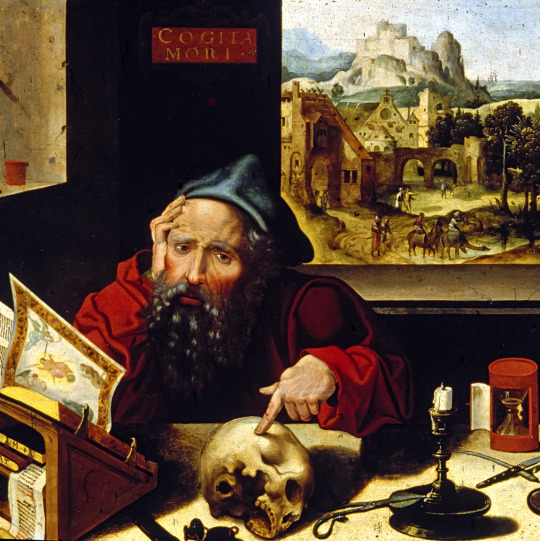
Hieronymus noster, the international symposium on the 1600th anniversary of death of Jerome, will take place in Ljubljana on October 24th–26th, 2019, at the Slovenian Academy of Sciences and Arts. It is being organised by the Slovenian Academy of Sciences and Arts; the Universities of Ljubljana, Zagreb, Graz, and Warsaw; Central European University (CEU); International Network of Excellence “Europa Renascens”; DANUBIUS Project (Université de Lille); and the Institut des Sources chrétiennes. The symposium is under the honorary patronage of Mr Borut Pahor, the President of the Republic of Slovenia. Wednesday, October 23 17.00 Registration and Opening Ceremony Atrium of ZRC SAZU, Novi trg 2 Thursday, October 24 Session 1 8.30 – 9.30 Plenary Lectures Academy Hall SAZU, Novi trg 3 Laurence Mellerin: Hieronymian studies at the Institut des Sources Chretiennes Jože Krašovec: The Development of St Jerome’s Views on the Translation and Interpretation of the Holy Bible Session 2 Section A Thursday 9.45 – 11.15 Academy Hall SAZU, Novi trg 3 Jerome and Theology 1 Chair: Danuta Schanzer Thomas Clemmons: Jerome’s Early Understanding of Society and the Church Michael A. Ennis: “Test All Things” – Jerome’s Theory and Practice with Suspicious Theologians Philip Polcar: Unciales Litterae and the pauperes Christi: The Economics of Jerome’s Ecclesiastical Influence Section B Thursday 9.45 – 11.15 Small Hall ZRC SAZU, Novi trg 4 Jerome’s Exegesis 1 Chair: Samo Skralovnik Sergio Zincone: L’interpretazione delle parabole evangeliche nel Commento di Girolamo al Vangelo secondo Matteo Miklos Istvan Foldvary: The Horns of Moyses Laszlo Takacs: St. Jerome and the Allegorical Interpretation of Exodus Jacobus Koos Kritzinger: The interpretation of ‘The Parable of the Prodigal Son’ by two Latin patristic authors, St Jerome and Petrus Chrysologus Section C Thursday 9.45 – 11.15 Prešeren Hall SAZU, Novi trg 4 Translating Holy Scripture Chair: Irena Avsenik Nabergoj Jean-Marie Auwers: Jerome cite-t-il ses propres traductions du Cantique des cantiques? Tiziano F. Ottobrini: Hebraica ueritas e filologia ispirata: Girolamo e la traduzione biblica come traduzione dello Spirito Krisztian Fenyves: From the “Veritas Graeca” to the “Veritas Hebraica” (in St.Jerome’s Commentaries) Edoardo Bona: Alla ricerca della Verita: il testo originale come Veritas Coffee Break 11.15 – 11.30 Session 3 Section A Thursday 11.30 – 13.00 Academy Hall SAZU, Novi trg 3 Jerome and Theology 2 Chair: David Movrin Peter Scheck: Benedict XV, Jerome and the Perennial Validity of Spiritus Paraclitus Judith Marie Gentle: Ecce Virgo Concipiet: The Enduring Theological Significance of De perpetua virginitate beatae Mariae adversus Helvidium Rebecca Keller: Jerome, Vigilantius, and the Cults of the Saints Section B Thursday 11.30 – 13.00 Small Hall ZRC SAZU, Novi trg 4 Jerome’s Exegesis 2 Chair: Samo Skralovnik Milena Joksimović: Adulter Vs. Moechus: Jerome’s Use of Terms for Adultery in Vulgata Anna Persig: Jerome as the reviser of the Vulgate Epistles: status quaestionis and New Approaches Alisa Kunitz-Dick: Jerome’s Commentary on Malachi: A Comparative Approach Section C Thursday 11.30 – 13.00 Prešeren Hall SAZU, Novi trg 4 Slovenian Section Chair: Rajko Bratož Rafko Valenčič: Kje si, Stridon? Metod Benedik: Emonska Cerkev v Hieronimovem času, njena notranja moč Gregor Sraka: Hieronimovi stiki z Ilirikom v času njegovega prebivanja na Vzhodu (375-420) Lunch Break 13.00 – 15.00 Session 4 Section A Thursday 15.00 – 16.45 Academy Hall SAZU, Novi trg 3 Jerome and Monastic Theology Chair: Jan Ciglenečki Danuta Shanzer: Jerome’s Demons: Demonizations vs. Demonology David Movrin: Holy Aemulatio: Jerome's Efforts to Outdo the Life of Antony Philip Marshall: Claustration in Jerome’s Advice to young women Jordina Sales-Carbonell: Jerome and the Western Monasticism: Asceticism, Evergetism and Orthodoxy within the Late Fourth Century Hispania Section B Thursday 15.00 – 16.45 Small Hall ZRC SAZU, Novi trg 4 Epistolography 1 Chair: Alenka Cedilnik Emmanuelle Mantel: La lettre de consolation chez saint Jerome Gina Derhard: Metaphors of Conversion to Asceticism in Jerome’s Letters Giovanna Martino: La regola educativa di S. Gerolamo: esempi di una institutio christiana nell’Epistolario geronimiano (Epp. 107 e 128) Emanuela Colombi: Fasting and Food: Dietary Prescriptions in Jerome’s Letters Section C Thursday 15.00 – 16.45 Prešeren Hall SAZU, Novi trg 4 Jerome and the Classics 1 Chair: Marko Marinčič Matej Hriberšek: Christian Ciceronian and His Zeal for Antiquity – Ancient Pagan Writers in the Saint Jerome’s Opus Isabella D’Auria: Note di approfondimento sulle teorie geronimiane relative a “traduzione” e “parafrasi” Miran Sajovic SDB: Aliquid de Latinitate Hieronymiana Felix Seibert: Interpretatio Christiana? Zur Funktion der Vergilzitate in den Briefen des Hieronymus Coffee Break 16.45 – 17.00 Session 5 Section A Thursday 17.00 – 18.30 Academy Hall SAZU, Novi trg 3 Jerome and Monasticism Chair: Jan Dominik Bogataj Jan Ciglenečki, Nena Bobovnik: Blue Deserts: Jerome and the Origins of Insular Monasticism on the Adriatic Florence Bret: Fondation et transmission dans la Vita Pauli et la Vita Hilarionis Jiři Šubrt: Historia castitatis. Jerome´s Life of Malchus as a Novelistic parable Fernando Monzon: Punti di coincidenza della Vita Malchi (VM) di San Girolamo con la Tradizione umanistica in quanto trasmissione letteraria, sapienziale e pedagogica Section B Thursday 17.00 – 18.30 Small Hall ZRC SAZU, Novi trg 4 Epistolography 2 Chair: Miran Sajovic Angela Zielinski Kinney: In Sickness and in Health: Illness and Injury in Jerome’s Correspondence Willum Westenholz: Must an Epistle be Epistolary? Jerome as a Case-Study Amy Oh: City and Wilderness in the Letters of Jerome Giorgia Grandi: La vita postuma di San Girolamo: Aspetti della sua fortuna nel novecento Section C Thursday 17.00 – 18.30 Prešeren Hall SAZU, Novi trg 4 Jerome and the Classics 2 Chair: Matej Hriberšek Marko Marinčič: An Exegete and a Poetess Facing Virgil: Some Backgrounds to Jerome‘s Criticism of the Christian Centos Ines Ivić: From Private to Popular Devotion: The Humanist Formation of the Cult of Saint Jerome as the National Saint in the 15th Century Dalmatia Anja Božič: Movere through St Jerome: Pier Paolo Vergerio’s Eighth Sermon in praise of St Jerome Friday, October 25 Session 6 Section A Friday 8.30 – 10.30 Academy Hall SAZU, Novi trg 3 Jerome and Aquileia Chair: Rajko Bratož Lukas J. Dorfbauer: Jerome’s Use of the Gospel Commentary by Fortunatianus of Aquileia Alessio Peršič: Due (o tre) “rustici” a confronto: Sulpicio Severo (con Martino) e Gerolamo Maurizio Girolami: Hieronymus magister, amicus et frater: Girolamo visto da Rufino di Concordia Miran Špelič OFM: Victorinus noster: Jerome of Stridon and Victorinus of Poetovio – Compatriots Section B Friday 8.30 – 10.30 Atrium of ZRC SAZU, Novi trg 2 Reception of Jerome 1 Chair: Aleš Maver Christopher M. Blunda: Between Jerome and Gennadius: Marcellinus Comes’ Chronicon s. a. 392 in Codex Parisinus BN Lat. 12161 Klaus Kronert: Jerome et les elements de structure des chroniques universelles du Moyen Age Deri Balaz: Jerome as the Most Important Source of Saint Gerard’s Deliberatio for Patristic Exegesis Pierre Chambert-Protat: Jerome in Carolingian Lyon: Medieval Reception and Philological Contributions Andrea Radošević: The Reception of St. Jerome in Late Medieval Sermon Collection Section C Friday 8.30 – 10.30 Prešeren Hall SAZU, Novi trg 4 Jerome and Art Chair: Rafko Valenčič Irena Avsenik Nabergoj: Saint Jerome’s Critique of the Literary Qualities of the Holy Bible Milena Mileva Blažić: Hieronim in pravljični tip ATU 156: Trn izdrt iz šape Reiner Sorries: Der Heilige Hieronymus in der islamischen Kunst Leon Debevec: Arhitektura Hieronimovih cerkva na Slovenskem Coffee Break 10.30 – 10.45 Session 7 Section A Friday 10.45 – 12.15 Academy Hall SAZU, Novi trg 3 Jerome and Theology 3 Chair: Andrew Cain Anto Barišić: A Review of Jerome´s Relation to Origen in the Light of the Second Vatican Council and Post-Conciliar Theology Jan Dominik Bogataj OFM: Jerome’s Interpretation of the Transfiguration in the Light of Some Recent Patristic Discoveries Leszek Misiarczyk: Impassibilitas et impeccantia: Jerome’s misunderstanding of ἀπαθεία in Evagrius Ponticus Norbert Widok: Theological Concepts of Gregory of Nazianzus in the Teaching of Jerome of Stridon Section B Friday 10.45 – 12.15 Atrium of ZRC SAZU, Novi trg 2 Reception of Jerome 2 Chair: Giulio Malavasi Agnes Korondi: Saint Jerome, a Model and an Author for Late Medieval Hungarian-Speaking Nuns Levente Pap: Hieronymus’s Reception in an Early 18th Century Hungarian Historical Work Javier de Prado Garcia: Reading the Faith on a Mission. Hieronymus’Citations in Early Modern Missionary Works Filomena Giannotti: Saint Jerome’s Postumous Life: Aspects of his Reception in the 20th Century Ivica Čairović: Jerome of Stridon and his Work in Serbian Theological-Historical Literature in the Second Half of the 20th and Early 21st Century Section C Friday 10.45 – 12.15 Prešeren Hall SAZU, Novi trg 4 Jerome and Liturgy Chair: Matjaž Celarc Silvio Košćak: St. Jerome in expositio missae of Amalar of Metz (775-850) and William Durand (1230-1296) Ivan Botica, Kristijan Kuhar: St. Jerome in the Heritage and Tradition of the Roman liturgy on the Croatian Church Slavonic Language Nikolaj Aracki Rosenfeld OCist: Evhološka besedila na čast svetemu Hieronimu ter variabilnost njihovih prevodov Coffee Break 12.15 – 12.30 Friday 12.30 Excursion: »Ubicating Jerome’s Stridonae« Saturday, October 26 Session 8 Section A Saturday 8.30 – 10.30 Academy Hall SAZU, Novi trg 3 History and Archaeology Chair: Alenka Cedilnik Dominic Moreau: Hieronymus Illyricianus: Les correspondants et autres relations de Jerome de Stridon dans la peninsule balkanique: une contribution a la Prosopographie chretienne du Bas-Empire Rajko Bratož: Hieronim kot zgodovinar svoje dobe: njegovi pogledi na krizne pojave in zaton rimskega cesarstva Bernarda Županek: Late Roman Emona: Understanding the Transformation of the City Andrej Gaspari: Cemetery of the Early Christian Community at Emona, Ljubljana: Preliminary Observations from the 2017–2018 Archaeological Research at the Gosposvetska cesta Site Craig H. Caldwell III: In mea patria rusticitatis vernacula: Jerome and Illyricum in Late Antiquity Section B Saturday 8.30 – 10.30 Atrium of ZRC SAZU, Novi trg 2 Jerome and Heresiology Chair: Rebecca Keller Carles Buenacasa Perez: Le role du donatisme dans l’heresiologie de Jerome Raul Villegas Marin: Jerome’s Contribution to the Making of the Pelagian Heresy: a Reassessment Mieczysław Celestyn Paczkowski: San Girolamo e il presunto millenarismo di Apollinare di Laodicea Katarina Palsson: The Rhetorical Function of Women in Jerome’s Heresiology Section C Saturday 8.30 – 10.30 Prešeren Hall SAZU, Novi trg 4 Jerome and Croatian Culture Chair: Rafko Valenčič Josip Bratulić: Sveti Jeronim u hrvatskoj kulturi Marko Medved: Sv. Jeronim u hrvatskoj crkvenoj povijesti i historiografiji – s posebnim osvrtom na njegov kult na širem području Rijeke Vesna Badurina Stipčević: La vita e la traslazione di San Girolamo nei testi croatoglagolitici Ana Mihaljević, Milan Mihaljević: St. Jerome’s Homilies on Luke’s Gospel in Croatian Glagolitic Breviaries Petra Stankovska: Homilije sv. Hieronima v srednjeveškem cerkvenoslovanskem prevodu Coffee Break 10.30 – 11.00 Session 9 Section A Saturday 11.00 – 12.30 Academy Hall SAZU, Novi trg 3 Origen and Augustine Chair: Miran Špelič Thomas P. Scheck: Jerome’s Origenistic Exegesis of Romans 9 (Epistle 120.10 to Hedibia) Vito Limone, Guilio Malavasi: Esegesi anti-origeniane nel commento a Geremia di Gerolamo Lucian Dincă: La correspondence entre Jerome et Augustin: l’interpretation de Ga 2,11-14 Mohamed-Arbi Nsiri: Entre Jerome et Augustin: correspondance croisee Section B Saturday 11.00 – 12.30 Atrium of ZRC SAZU, Novi trg 2 Varia 1 Chair: Matjaž Celarc Andrea Svobodova: St. Jerome and Old Czech Bible Antonio Davila Perez: St. Jerome vs. Santes Pagnino in the Reception and Inquisitorial Process of the Polyglot Bible of Antwerp (1568-1577) Marie Rebeille-Borgella: La diffusion de la revision hieronymienne des traductions bibliques dans les livres liturgiques latins (Ve-XIIe siecle): l’exemple des petits prophetes Section C Saturday 11.00 – 12.30 Prešeren Hall SAZU, Novi trg 4 Varia 2 Chair: David Movrin Aleš Maver: Podoba prvih dveh stoletij krščanstva v Znamenitih možeh in njen vpliv na srednji in novi vek Javier A. Domingo, Luigi Finocchietti: San Girolamo a Roma: Ipotesi storiche e archeologiche Hrvoje Gračanin: Jerome‘s Illyricum Mirja Jarak: Early Christian Painting and Sculpture in Illyricum During the Second Half of the 4th and Early 5th Century Lunch Break 12.30 – 15.00 Session 10 All Sections Academy Hall SAZU, Novi trg 3 Saturday 15.00 – 16.15 Concluding Plenary Lectures Heinrich Schlange-Schoningen: Hieronymus und Rufinus: Freundschaft und Theologie in der Spatantike Andrew Cain: Why did Jerome Comment on Paul? An Etiological Investigation of His Commentaries on the Epistles to the Galatians, Ephesians, Titus, and Philemon 16.30 Conclusion Miran Špelič 17.00 Roman Emona (Walking Tour) Organizing Committee Pablo Argárate, Institute of Ecumenical Theology, Eastern Orthodox Church and Patrology, Faculty of Catholic Theology at the Karl-Franzens-University Graz Ivan Bodrožić, Department of the History of Christian Literature and Christian Teaching, Catholic Faculty of Theology Zagreb Jan Dominik Bogataj OFM, Victorinianum Patristic Institute, Faculty of Theology, University of Ljubljana, secretary Rajko Bratož, Slovenian Academy of Sciences and Arts Alenka Cedilnik, History Department, Faculty of Arts, University of Ljubljana Antonio Dávila Pérez, Department of Classical Philology, University of Cádiz – International Network Europa Renascens Laurence Mellerin, Institut des Sources chrétiennes (HISOMA-UMR 5189 research centre) Dominic Moreau, DANUBIUS Project (Université de Lille/HALMA-UMR 8164 research centre) David Movrin, Department of Classical Philology, Faculty of Arts, University of Ljubljana Elżbieta M. Olechowska, Faculty of Artes Liberales, University of Warsaw Katalin Szende, Department of Medieval Studies, Central European University, Budapest/Vienna Marjeta Šašel Kos, Institute of Archaeology, Research Centre of the Slovenian Academy of Sciences and Arts, Ljubljana Miran Špelič OFM, Victorinianum Patristic Institute, Faculty of Theology, University of Ljubljana Rafko Valenčič, Faculty of Theology, University of Ljubljana Read the full article
2 notes
·
View notes
Text

J'ai publié 640 fois en 2022
C'est 435 billets de plus qu'en 2021 !
370 billets créés (58%)
270 billets reblogués (42%)
Les blogs que j'ai le plus reblogués :
@everythingfox
@avlewis
@the-optimistic-idiot
@goohans
@fu11metal
J'ai étiqueté 58 billets en 2022
#cute - 17 billets
#wholesome - 15 billets
#aww - 14 billets
#animals - 14 billets
#cat - 7 billets
#dog - 7 billets
#funny - 7 billets
#video - 6 billets
#dogs - 6 billets
#cats - 5 billets
Longest Tag: 119 characters
#lowkey wish they'd draw characters with different features and bodies tho... im curious how their style would translate
Mes billets vedette en 2022 :
n°5
A toutes mes followeuse fr x) j'ai une question débile xD est ce que c'est normal qu'à 25ans j'arrive pas à m'habiller comme une "femme" alors que pour moi c'est obscur owo ça veut dire quoi? Rassurez vous je ne mets pas des licornes rose xD mon style vestimentaires ce résume à des vans noir, un jean et soit un t-shirt soit un hoodie x) je demande par ce qu'on m'a fait la remarque récemment je cite "t'as 25ans habille toi de manière plus féminine" alors désolée mais mon taff me permet pas ça et en général je préfère être confortables x) oops
5 notes - publié le 28 mars 2022
n°4
Crise d'asthme dans la nuit qui me réveille, on apprécie, alors là totale du mal à respirer,nez qui coule,douleur dans la poitine, yeux qui piquent/qui pleurent x) aled je sens que je vais faire un tour chez l'allerguologue j'ai pas l'orthographe
5 notes - publié le 11 février 2022
n°3


Voir l'intégralité du billet
7 notes - publié le 1 mars 2022
n°2
Soudainement j'ai un vieux souvenir de collègue qui me revient x) il avait neigé je crois? Je sais plus exactement x) mais la n'est pas la question.
Pour faire court je me souviens avoir envoyé mon sac à dos de 6eme, qui soit dit en passant était immense XDD dans la bouche d'un débile du cul qui avait dit que les filles étaient faible, sur le moment ça m'a mise hors de moi, j'étais prête à lui sauter dessus xD mais un surveillant et venue nous emmener au cpe x) et j'ai du m'excuser pour l'avoir tapé, honnêtement j'ai jamais pensé ses excuses et je suis convaincu d'avoir eu raison.
13 notes - publié le 15 juin 2022
Mon billet n°1 en 2022
A midi pour fêter nos 7ans de relation avec mon homme et moi sommes allés dans un restaurant gastronomique et omg, c'était parfait entrée tartare de saumon avec mangue avocat oignons et une crème de choux il me semble ? Puis en plats du filets de St Pierre avec un petit rissoto fabuleux et en dessert un délicieux fondant au chocolat.
@the-optimistic-idiot je suis certaine que tu aurais adorée 🤩
13 notes - publié le 9 mars 2022
Obtenez votre année 2022 en revue sur Tumblr →
#tumblr2022#année en revue#mon année tumblr 2022 en revue#votre année tumblr en revue#year in review#my 2022 tumblr year in review#your tumblr year in review
1 note
·
View note
Photo

‘Patriot Priests: French Catholic Clergy & National Identity in WW I’ (2018) by Anita Rasi May [historian] is a good follow-up to ‘Stronger than Steel!’. It describes the mobilization of the French clergy in WW I. Military laws passed in 1889 & in 1905 provided for the drafting of seminarians & priests into military service. The Vatican provided special rules & dispensations as canon law specially forbade the clergy to kill. The French Republic dissolved the Jesuits previously & placed other religious orders with possible expulsions. When war was declared clergy, religious, & bishops returned to France & responded. Either as non-combat stretcher-bearers, nurse, or chaplain, or as a combatant (soldier-priests) in the infantry, artillery, calvary, & newly formed air force. As a Military Chaplain (controlled by the Ministry of War) or Volunteer Chaplain (controlled by the Health Service). There was a 3rd kind of chaplain, the ‘benevole’ or unofficial volunteer (unpaid). May uses letters & journals from many priests & seminarians. Two Jesuits in particular. Louis Lenoir, SJ (pic 10) who after the war was memorialized in the Army Museum in Les Invalides. His clerical garb & portable altar are on display there amongst other items documenting the war. The other Pierre Teilhard de Chardin, SJ (pic 7,8,9) who served as a stretcher-barer, was eventually raised to chaplain, awarded the Medaille militaire & the Legion d’honneur. Not mentioned is Blessed Daniel Brottier, CSSp (pic 6) volunteer chaplain. Cited 6 times for bravery, awarded the Croix de guerre & the Legion d’honneur. Attributed his survival to St Therese of Lisieux, & built her a chapel at Auteuil. After the war, he organized the National Union of Servicemen for French veterans of various conflicts. The soldier priests would demonstrate the French Catholic Church’s patriotism, as full-fledged Frenchmen. It would help to confine the anti-clerical movement post WW I. https://www.instagram.com/p/Ck_y8SNJzay/?igshid=NGJjMDIxMWI=
0 notes
Text
Conservatives say they're about to set another new membership record (cbc.ca)
Some predict it could be the largest number of Canadians ever to join a political party at any time in Canadian history. Multiple Conservative Party of Canada sources says more than 400,000 people have joined or renewed their memberships since the leadership race began.
"There is unprecedented interest in joining the Conservative Party of Canada," Rob Batherson told CBC News. People are really motivated right now in this post-pandemic timeframe, a senior strategist says.
Batherson wouldn't confirm the 400,000 figure or disclose the current number of party memberships. Memberships can be purchased online until 11:59 pm ET on Friday.
Batherson said he doesn't expect the final tally to be confirmed until many days from now.
The CPC has set a record for new and existing memberships in a leadership race — 269,469 in total. When Justin Trudeau won the Liberal leadership in 2013, the party had 127K registered voters. Party insiders say this year's race is expected to significantly surpass that number.
Batherson said the teams themselves often submit large numbers of new memberships from their campaigns.
Paradis said the party is falling behind on membership processing.
With the clock ticking down to the deadline, all six candidates have been scrambling to sign up supporters through social media and in person.
Addressing a huge crowd in Saskatoon Tuesday night, Pierre Poilievre encouraged his supporters to get their neighbours, friends and family members to sign up.
Candidate Leslyn Lewis was in St John's on Wednesday night.
"Different issues are emerging where people are gravitating toward those individuals who dare to talk about those issues," she said, citing her opposition to vaccine mandates, among other things.
Patrick Brown took his message to Montreal on Wednesday night at a dinner organized by the Muslim community.
On Friday Brown’s campaign sent out a note to supporters claiming his campaign is on the "cusp of victory" after having sold 150,000 memberships.
The Charest campaign says it has sold memberships in every riding across Canada.
The party says it has re-engaged and signed up thousands of new members who have not been involved since the Harper government.
"Particularly, we are excited to see engagement from Quebec and Atlantic Canada."
Roman Baber has used social media almost daily to reach out to supporters.
"The teams are always inflating what they've sold to try to psych each other out," says Steve Paradis.
The six candidates and their teams now shift to persuasion mode, hoping to convince those hundreds of thousands of members to vote for them.
"Frankly, we haven't really seen what's been going on because they've been solely focused on selling memberships on the ground,” he says.
"Now we'll start to see probably more [of] what people would think of as a traditional campaign."
0 notes
Text
Did Any Republicans Vote For Trump Impeachment
New Post has been published on https://www.patriotsnet.com/did-any-republicans-vote-for-trump-impeachment/
Did Any Republicans Vote For Trump Impeachment

Mcconnell Says House Prosecutors Proved Trump Incited Attack On Capitol Though He Voted To Acquit Because Trump Is No Longer In Office
9:10 AM on Feb 13, 2021 CST — Updated at 5:12 PM on Feb 13, 2021 CST
WASHINGTON — Donald Trump’s historic second impeachment trial ended Saturday with acquittal on a 57-43 vote, with seven Republicans and all Democrats voting that the former president incited insurrection.
Though 10 votes shy of the two-thirds needed, it was the most bipartisan vote for conviction in any of the four presidential trials in U.S. history and, by far, the shortest.
Democrats insisted the trial would leave an indelible mark on Trump’s legacy. The 45th president is the only U.S. president impeached and acquitted twice.
“He has been discredited in the eyes of the American people and in the judgment of history,” said Senate Majority Leader Chuck Schumer, a New York Democrat.
Texas Sens. John Cornyn and Ted Cruz voted for acquittal.
The Republicans who voted to convict were Sens. Richard Burr of North Carolina, Bill Cassidy of Louisiana, Susan Collins of Maine, Lisa Murkowski of Alaska, Mitt Romney of Utah, Ben Sasse of Nebraska and Pat Toomey of Pennsylvania.
One year and one week ago, at Trump’s first trial, Romney had been the only Republican voting to convict and remove him from office on a charge of abuse of power.
“President Trump is practically and morally responsible for provoking the events of the day. No question about it,” McConnell said, accusing Trump of peddling a “wild myth” that he had won the election and engaging in “unconscionable” behavior before and during the Jan. 6 attack.
While Most Republicans Are Likely To Vote To Acquit The Former President A Handful Of Votes Appear To Be In Play
@Rubinations
Former President Donald Trump’s impeachment trial on a charge of inciting the riot at the Capitol Jan. 6 begins with the battle lines clearly drawn. The partisan math makes it unlikely there will be the 67 votes necessary for a conviction. But at least a handful of Republican senators do appear to be in play to join what will likely be all the Democrats in voting to convict.
Forty-four of the Senate’s 50 Republicans voted Tuesday that the trial was unconstitutional because Mr. Trump has left office. Most legal experts disagree with that argument, but it was embraced by both the Trump defense team and even senators who believe he bears some responsibility for the riot, like Senate Minority Leader Mitch McConnell. Here are the most important Republican senators to watch during the second Trump impeachment trial.
Sen. Mitt Romney
Sen. Susan Collins
Ms. Collins has long held Trump at arm’s-length, especially when running successfully for a fifth term last year. Ms. Collins frequently falls back on a refrain that as a juror she can’t comment on impeachment proceedings until she gets to hear from the prosecution and the defense, but she has sharply criticized Trump’s conduct. “He incited them in the first place” and later failed to quell the violence by his supporters “by repeating his grievances and telling the rioters that he knew how they felt,” she wrote in a first-person account of Jan. 6 for the Bangor Daily News.
Sen. Lisa Murkowski
The 7 Republican Senators Who Voted To Convict Former President Donald Trump Explain Their Rationale
Donald Trump’s second impeachment trial came to an end Saturday with 57 senators voting to convict, falling short of the two-thirds margin required to find him guilty of the charge of “incitement of insurrection” in connection with the Jan. 6 riot at the U.S. Capitol that resulted in five deaths. Seven GOP senators broke with their party — voting along with all 48 Democrats and both independents in the body.
After the 57-43 vote, the Republicans who defied Trump explained their decision.
Richard Burr, North Carolina
“The facts are clear,” Burr said in a statement after the vote. “The President promoted unfounded conspiracy theories to cast doubt on the integrity of a free and fair election because he did not like the results. As Congress met to certify the election results, the President directed his supporters to go to the Capitol to disrupt the lawful proceedings required by the Constitution. When the crowd became violent, the President used his office to first inflame the situation instead of immediately calling for an end to the assault.”
Burr originally voted that the trial was unconstitutional, but said in his statement that “the Senate is an institution based on precedent, and given that the majority of the Senate voted to proceed with this trial, the question of constitutionality is now established precedent.”
He has already announced he will not be running for reelection in 2022.
Bill Cassidy, Louisiana
Susan Collins, Maine
Lisa Murkowski, Alaska
Mitt Romney, Utah
:58 Pm Mcconnell: ‘the Framers Built The Senate To Keep Temporary Rage From Doing Permanent Damage’
“The Framers predicted that factional fever might dominate house majorities from time to time,” Senate Majority Leader Mitch McConnell says in the final floor speech before the Senate vote.”They knew the country would need a firewall to keep partisan flames from scorching, scorching, our republic. So, they created the senate. Out of necessity, James Madison wrote, of some stable institution in the government. Today we will fulfill this founding purpose. We will reject this incoherent case that comes nowhere near justifying the first presidential removal in history. This partisan impeachment will end today. But I fear the threat to our institutions may not,” McConnell says.
He continues, “Because this episode is one of a symptom of something much deeper. In the last three years, the opposition to this president has come to revolve around a truly dangerous concept,” McConnell says. “Normally when a party loses an election, it accepts feat. It reflects and retools. But not this time.”
“The framers built the Senate to keep temporary rage from doing permanent damage,” McConnell says.
Republicans Have Questioned The Constitutionality Of The Trial To Prevent It From Moving Forward

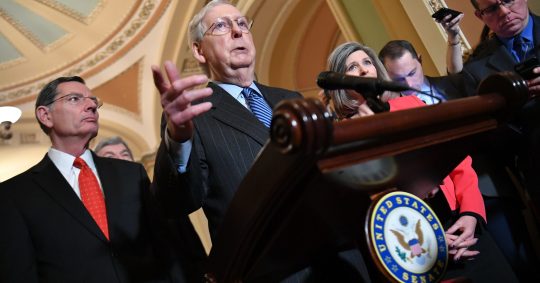
Day one of Trump’s second impeachment trial was primarily focused on debates about its constitutionality, since Republicans have increasingly argued that it’s unconstitutional to try a former president — even though most legal scholars disagree, a fact Democratic House impeachment managers emphasized Tuesday.
As Vox’s Ian Millhiser has explained, a majority of legal scholars have concluded that holding an impeachment trial for a former president would be constitutional. However, the precedent for how to handle the impeachment of a former government official is less clear: In 1876, Secretary of War William Belknap faced a Senate trial after he had already resigned, and though a majority voted to proceed with the trial, two-thirds did not vote to convict, with multiple lawmakers citing concerns about the proceedings’ constitutionality.
The House impeachment managers and Trump’s counsel presented their respective arguments on this matter Tuesday, with Democrats emphasizing that impeachment is still viable for officials who’ve left office because the Constitution’s authors intended it as a way to ensure accountability, while Trump’s attorneys tried to paint the trial as a partisan effort for political gain.
Related
Trump won’t be convicted. Impeachment is still worth it.
Ultimately, as the result of the final constitutionality vote suggests, their arguments seemed only to reaffirm where senators, on both sides of the aisle, already stood.
Madison Cawthorn Attacks Dr Fauci: We Want To Prosecute This Guy To The Full Ability Of The Law
David Badash
U.S. Rep. Madison Cawthorn is attacking Dr. Anthony Fauci, saying House Republicans will “prosecute” the esteemed immunologist and director of the U.S. National Institute of Allergy and Infectious Diseases , as a “pawn of the Chinese Communist Party” and for lying to Congress.
There is no evidence either of those claims are true.
Speaking to former Trump attorney Jenna Ellis, the host of “Just the Truth” on the Real America’s Voice website, Cawthorn falsely claimed Dr. Fauci has “directly lied to Congress,” echoing a claim made by Senator Rand Paul on Wednesday. Ellis, who claims to be a “constitutional law attorney,” did not mention to Cawthorn that the House of Representatives does not have the power to criminally prosecute.
“I’ll tell you when we take the majority back in 2022, I’ll make sure consequences are doled out,” Cawthorn promised. “But we want to prosecute this guy to the full ability of the law because I’ll tell you to lie to the American people just to get your name in the news just to see your face on the cover of books just to get fame or fortune, I’ll tell you, Dr. Anthony Fauci does not deserve either fame or fortune.”
On Wednesday Cawthorn told Newsmax, “I think we should indict Jill Biden.”
Watch:
Rep. Madison Cawthorn vows that if the GOP gains control of the House in 2022, he will “make sure that consequences are doled out” to Dr. Anthony Fauci: “We want to prosecute this guy to the full ability of the law.”pic.twitter.com/kFN0rGOCGJ
Guns For Hire: Gop Governor Accused Of Renting Out South Dakotas National Guard Troops As For
David Badash
It may be called South Dakota but the “Mount Rushmore State” is pretty far up in the northern United States. And yet Governor Kristi Noem, a Trump-loving far right Republican, is sending her National Guard troops to patrol the border: the Southern Border, in Texas.
The capitol of South Dakota, Pierre, is over 1100 miles from Texas Governor Greg Abbott’s capital city of Austin, about a 17 hour drive according to Google, if you don’t stop to eat or sleep.
Gov. Noem is sending her National Guard troops down to the Lone Star State to help out Gov. Abbott with the “ongoing violations of state and federal law by illegal aliens crossing the unsecured border,”she has just announced.
Who’s paying for these soldiers?
In a statement Noem says “private donations,” the source of which she does not disclose. Nor does she say where the funds are going.
“The Biden Administration has failed in the most basic duty of the federal government: keeping the American people safe,” Governor Noem’s statement reads.. “The border is a national security crisis that requires the kind of sustained response only the National Guard can provide. We should not be making our own communities less safe by sending our police or Highway Patrol to fix a long-term problem President Biden’s Administration seems unable or unwilling to solve. My message to Texas is this: help is on the way.”
“The deployment will be paid for by a private donation.”
— Amanda Carpenter June 29, 2021
’30 Republican Senators Would Vote To Impeach Trump’ If Vote Was Secret Gop Consultant Claims
U.S.RepublicansDonald TrumpDemocratsUkraine
Prominent GOP consultant Mike Murphy claimed on Wednesday that he was told by a Republican senator that the majority of Republican senators “would vote to impeach” President Donald Trump if they could do so anonymously.
“These Senate Republicans, should the Democrats vote impeachment, which is far more likely than not, are going to be pinned down to a yes/no answer,” Murphy, who previously advised Republican politicians including Mitt Romney, John McCain and Jeb Bush, said in an interview with MSNBC.
“The politics of it will get worse and worse for Trump,” the Republican political consultant, who has long been critical of Trump, said.
“One Republican senator told me if it was a secret vote, 30 Republican senators would vote to impeach Trump,” he claimed, suggesting that the GOP lawmakers are concerned that voting against the president could harm them politically. The Senate is currently controlled by Republicans, with 53 GOP lawmakers serving in the legislative body.
On Tuesday, Murphy published an op-ed in The Washington Post, urging lawmakers to pursue Trump’s impeachment following revelations that the president had pressured Ukraine to launch an investigation into the business dealings of Hunter Biden, the son of the president’s political opponent, Democratic presidential hopeful Joe Biden.
Over the weekend, prior to the transcript’s release, Romney also voiced serious concern via Twitter.
Pelosi Announces Heavy Fines For Refusing To Follow New House Chamber Screening Protocols
House Speaker Nancy Pelosi, D-Calif., announced that heavy fines will be imposed on House members who refuse to follow the new screening protocols.
“Many House Republicans have disrespected our heroes by verbally abusing them and refusing to adhere to basic precautions keeping members of our Congressional community, including the Capitol Police, safe,” she said in a statement.
“The House will soon move forward with a rule change imposing fines on those who refuse to abide by these protections. The fine for the first offense will be $5,000 and $10,000 for the second offense. The fines will be deducted directly from Members’ salaries by the Chief Administrative Officer,” she said.
“It is tragic that this step is necessary, but the Chamber of the People’s House must and will be safe,” Pelosi said.
House Republicans Face Some Backlash Over Vote To Impeach Sounding A Warning To Senators
January 28, 2021 / 7:01 AM / CBS News
Republicans divided in post-Trump era06:18
In his first phone town hall since voting to impeach former President Trump, a voter told South Carolina Congressman Tom Rice his decision was “inexcusable.”
“Next time around, I don’t think you’re going to get elected,” said his Myrtle Beach constituent, from the district Rice has represented since 2013. “I’m not happy with you. And I certainly won’t vote for you again. So if you can figure out some way to redeem yourself, I’m all ears.”
But the next caller, an 80-year-old woman, commended Rice for the “tremendous courage” he showed by voting for impeachment.
“If you want a Congressman that is going to bow down to bullies… that’ll go along with the crowd, ‘Oh, everybody else on this side voted this way, so I better vote that way so people back home don’t question me — if that’s the guy you want, then I’m not your guy,” Rice said.
“But if you want somebody who’s gonna stand up for what’s right, and protect our Constitution like I took an oath to do, then I am your guy.”
For Rice and the nine other House Republicans who voted for impeachment, Mr. Trump’s rally speech before the attack at the Capitol and his long silence as rioters breached the building was reason enough to join Democrats in impeaching the president a second time.
But their decision was met with an immediate backlash from many constituents, local parties and their Republican colleagues.
Rebecca Kaplan contributed reporting.
Gop Leader Mccarthy: Trump ‘bears Responsibility’ For Violence Won’t Vote To Impeach
Some ambitious Republican senators have never been as on board the Trump train as the more feverish GOP members in the House, and the former might be open to convicting Trump. But their ambition cuts two ways — on the one hand, voting to ban Trump opens a lane to carry the Republican mantle in 2024 and be the party’s new standard-bearer, but, on the other, it has the potential to alienate many of the 74 million who voted for Trump, and whose votes they need.
It’s a long shot that Trump would ultimately be convicted, because 17 Republicans would need to join Democrats to get the two-thirds majority needed for a conviction. But it’s growing clearer that a majority of the Senate will vote to convict him, reflecting the number of Americans who are in favor of impeachment, disapproved of the job Trump has done and voted for his opponent in the 2020 presidential election.
Correction Jan. 14, 2021
A previous version of this story incorrectly said Rep. Peter Meijer is a West Point graduate. Meijer attended West Point, but he is a graduate of Columbia University.
Trump Acquitted In Impeachment Trial; 7 Gop Senators Vote With Democrats To Convict
Dareh Gregorian
The Senate on Saturday voted to acquit former President Donald Trump on a charge of incitement of insurrection despite significant Republican support for conviction, bringing an end to the fourth impeachment trial in U.S. history and the second for Trump.
Seven Republicans voted to convict Trump for allegedly inciting the deadly Jan. 6 riot at the Capitol, when a mob of pro-Trump supporters tried to disrupt the electoral vote count formalizing Joe Biden’s election win before a joint session of Congress. That is by far the most bipartisan support for conviction in impeachment history. The final vote was 57 to 43, 10 short of the 67 votes needed to secure a conviction.
Republican Sens. Richard Burr of North Carolina, Susan Collins of Maine, Bill Cassidy of Louisiana, Lisa Murkowski of Alaska, Mitt Romney of Utah, Ben Sasse of Nebraska and Pat Toomey of Pennsylvania all voted guilty.
The vote means the Senate cannot bar Trump from holding future federal offices.
Moments after the vote concluded, the former president issued a statement praising his legal team and thanking the senators and other members of Congress “who stood proudly for the Constitution we all revere and for the sacred legal principles at the heart of our country.”
“This has been yet another phase of the greatest witch hunt in the history of our Country. No president has ever gone through anything like it,” Trump said.
House Votes To Impeach Trump But Senate Trial Unlikely Before Biden’s Inauguration

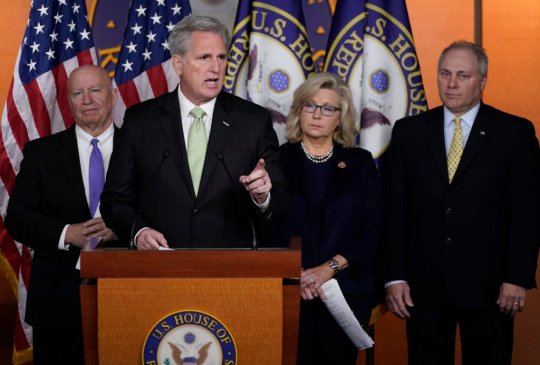
9. Rep. John Katko, New York’s 24th: Katko is a moderate from an evenly divided moderate district. A former federal prosecutor, he said of Trump: “It cannot be ignored that President Trump encouraged this insurrection.” He also noted that as the riot was happening, Trump “refused to call it off, putting countless lives in danger.”
10. Rep. David Valadao, California’s 21st: The Southern California congressman represents a majority-Latino district Biden won 54% to 44%. Valadao won election to this seat in 2012 before losing it in 2018 and winning it back in the fall. He’s the rare case of a member of Congress who touts his willingness to work with the other party. Of his vote for impeachment, he said: “President Trump was, without question, a driving force in the catastrophic events that took place on January 6.” He added, “His inciting rhetoric was un-American, abhorrent, and absolutely an impeachable offense.”
Raskin Compares Trumps Actions On January 6 To Lighting A Fire In Closing Argument
Trump lawyer Michael van der Veen, meanwhile, insisted his client did nothing wrong and maintained he was the victim of vengeful Democrats and a biased news media. He called the impeachment proceedings a “charade from beginning to end.”
While he often seemed angry during his presentation, van der Veen was delighted by the acquittal. Reporters saw him fist bump a fellow member of Trump’s legal team afterward and exclaim, “We’re going to Disney World!”
“While a close call, I am persuaded that impeachments are a tool primarily of removal and we therefore lack jurisdiction,” the influential Kentucky Republican wrote in the email, which was obtained by NBC News.
McConnell, who’d rebuffed Democratic efforts to start the trial while Trump was still in office, had condemned Trump’s conduct after the riot and said he’d keep an open mind about voting to convict — something he’d ruled out entirely during Trump’s first impeachment trial last year.
After voting to acquit, McConnell blasted Trump for his “disgraceful dereliction of duty” and squarely laid the blame for the riot at Trump’s door in what amounted to an endorsement of many of the arguments laid out by House impeachment managers.
“There’s no question — none — that President Trump is practically and morally responsible for provoking the events of the day,” McConnell said in a speech on the Senate floor.
Cassidy gave a simple explanation for his vote in a 10-second video statement he posted on Twitter.
Trump Releases New Video Condemning Capitol Riot But Does Not Mention Impeachment
President Donald Trump released a video Wednesday to offer his most forceful condemnation yet of last week’s riot at the U.S. Capitol.
Trump did not mention his impeachment in the taped message, which was released on the White House Twitter account after his personal account was suspended.
“I want to be very clear. I unequivocally condemn the violence that we saw last week. Violence and vandalism have absolutely no place in our country and no place in our movement,” Trump said.
“No true supporter of mine could ever endorse political violence. No true supporter of mine could ever disrespect law enforcement or our great American flag,” he added. “No true supporter of mine could ever threaten or harass their fellow Americans — if you do any of these things, you are not supporting our movement, you’re attacking it, and you are attacking our country.”
In the video, Trump also discussed “unprecedented assault on free speech,” referring to his ban from several social media sites.
He closed the remarks by calling on Americans to come together.
‘a Win Is A Win’: Trump’s Defense Team Makes Remarks After Senate Votes To Acquit
Despite the acquittal, President Joe Biden said in a statement that “substance of the charge” against Trump is “not in dispute.”
“Even those opposed to the conviction, like Senate Minority Leader McConnell, believe Donald Trump was guilty of a ‘disgraceful dereliction of duty’ and ‘practically and morally responsible for provoking’ the violence unleashed on the Capitol,” Biden’s statement read in part.
The president added that “this sad chapter in our history has reminded us that democracy is fragile. That it must always be defended. That we must be ever vigilant. That violence and extremism has no place in America. And that each of us has a duty and responsibility as Americans, and especially as leaders, to defend the truth and to defeat the lies.”
Senate Majority Leader Chuck Schumer, D-N.Y., called Saturday’s vote “the largest and most bipartisan vote in any impeachment trial in history,” but noted it wasn’t enough to secure a conviction.
The trial “was about choosing country over Donald Trump, and 43 Republican members chose Trump. They chose Trump. It should be a weight on their conscience today, and it shall be a weight on their conscience in the future,” he said in a speech on the Senate floor.
With control of the Senate split 50-50, the House managers always had an uphill battle when it came to convincing enough Republicans to cross party lines and convict a former president who is still very popular with a large part of the GOP base.
Trump Calls For ‘no Violence’ As Congress Moves To Impeach Him For Role In Riot
This time, there will be more. Some Republican senators have called on Trump to resign, and even Senate Majority Leader Mitch McConnell said he is undecided at this point.
Trump’s impeachment won’t lead to his removal — even if he is convicted — because of the timeline. The Senate is adjourned until Tuesday. The next day, Biden will be sworn in as the 46th president. But there’s another penalty the Constitution allows for as a result of a Senate conviction that could be appealing to some Republican senators — banning Trump from holding “office” again.
While there is some debate as to the definition of “office” in the Constitution and whether that would apply to running for president or even Congress, that kind of public rebuke would send a strong message — that Republicans are ready to move on from Trumpism.
Rep Tim Ryan: Probe Underway On Whether Members Gave Capitol Tours To Rioters
7. Rep. Jaime Herrera Beutler, Washington’s 3rd: Herrera Beutler was swept in with the Tea Party wave in 2010, but her district is a moderate one. Trump won it 51% to 47%. Herrera Beutler gained prominence several years ago for giving birth to a child three months early, born without kidneys and a rare syndrome. Her daughter, Abigail, became the first to survive the often-fatal condition. The now-mother of three and congresswoman from southwest Washington state declared on the House floor her vote in favor of impeachment: “I’m not choosing sides, I’m choosing truth.”
8. Rep. Peter Meijer, Michigan’s 3rd: Meijer is a freshman, who won his seat with 53% of the vote. He represents a district that was previously held by Justin Amash, the former Republican-turned-independent who voted in favor of Trump’s impeachment in 2019. Meijer, a Columbia University grad who served in Afghanistan, is a social conservative in favor of restrictions on abortion rights and against restrictions on gun rights and religious freedoms. But he said Trump showed no “courage” and “betrayed millions with claims of a ‘stolen election.’ ” He added, “The one man who could have restored order, prevented the deaths of five Americans including a Capitol police officer, and avoided the desecration of our Capitol, shrank from leadership when our country needed it most.”
Justin Amash Who Just Left The Republican Party In July Voted For Impeachment
GettyAmash
All the Republicans voted against impeachment except for Rep. Justin Amash. But in July, Amash actually switched his party from Republican to Independent. Amash is the House Representative from Michigan’s 3rd District. Michigan also just happens to be the state where Trump is holding a rally today during the impeachment vote.
Amash has been a representative in Michigan since 2011.
The day before the House vote, Amash tweeted about the proceedings. He wrote: “Conservatives will someday face the horrible truth that the Republican Party fought so hard to justify and excuse an amoral and self-serving president, and what he gave them in return was bigger government and erosion of the principles and values they once claimed to cherish.”
Conservatives will someday face the horrible truth that the Republican Party fought so hard to justify and excuse an amoral and self-serving president, and what he gave them in return was bigger government and erosion of the principles and values they once claimed to cherish.
— Justin Amash December 18, 2019
When Amash declared his “Independence” on July 4, 2019, he wrote a column in The Washington Post about his decision. He referenced George Washington’s farewell address and his concern about the dangers of a two-party political system, warning against partisanship. He then said that Washington’s fears came to pass.
Republicans Refused To Show Up For The Full Impeachment Trial Of Donald Trump
David Badash
Fifteen of the 50 Republican Senators refused to show up for at least “the first few hours” of Thursday’s arguments by the Democratic managers in the Senate impeachment trial of former President Donald Trump, CNN’s Manu Raju and Forbes report.
That’s 30 percent of the Republican caucus in the Senate, or nearly one-third of the GOP members.
“Sens. Lindsey Graham and Rand Paul were both away from their desks, for instance, while Sen. Jim Risch was in the basement on his phone, CNN’s Manu Raju reported,” Forbes adds.
“Many within the chamber were preoccupied with other activities: Sens. Tom Cotton and Chuck Grassley were reading papers, while, according to CNN’s Jeremy Herb, Sen. Rick Scott ‘had a blank map of Asia on his desk and was writing on it like he was filling in the names of the countries.’”
Worse, at least one Republican Senator has already violated his oath to deliver “impartial justice.”
Senators are required to swear or affirm that he or she will “do impartial justice according to the Constitution and laws.”
But Senator John Boozman “said Thursday that he has decided he will vote to acquit Trump because he believes the trial is unconstitutional, putting himself on record among Republican senators who are likely or certain to oppose conviction,”NBC News reports.
“This was unconstitutional. And so it makes it difficult to back up,” Boozman told reporters Thursday afternoon.
Clear Call To Violence: Experts Slam Gaetz For Inciting Another Insurrection


David Badash
U.S. Rep. Ted Lieu says Rep. Matt Gaetz is “urging people to shoot Silicon Valley employees.” Congressman Lieu is not alone. Others, including experts, are delivering similar criticism and warnings after Gaetz on Thursday delivered disturbing remarks calling for Americans to fulfill their constitutional “obligation” to “use” the Second Amendment.
“The internet’s hall monitors out in Silicon Valley, they think they can suppress us, discourage us — maybe if you’re just a little less patriotic, maybe if you just conform to their way of thinking a little more, you’ll be allowed to participate in the digital world,” Gaetz said at a Thursday rally with Rep. Marjorie Taylor Greene .
“Well, you know what? Silicon Valley can’t cancel this movement or this rally or this congressman. We have a Second Amendment in this country, and I think we have an obligation to use it.”
“The Second Amendment – this is a little history lesson for all the fake news media. The Second Amendment is not about, it’s not about hunting, it’s not about recreation, it’s not about sports. The Second Amendment is about maintaining, within the citizenry, the ability to maintain an armed rebellion against the government if that becomes necessary,” Gaetz, who is under DOJ investigation for possible sex trafficking and possible sex with a 17-year old, told supporters.
To be clear, Gaetz’s claim is false.
Lieu once again called for Gaetz to be removed from the Judiciary Committee.
Democratic consultant:
Pelosi Signs Article Of Impeachment Against Trump: ‘no One Is Above The Law’
She was flanked by the House managers — the lawmakers who will serve as Trump’s prosecutors in the Senate — as she signed the document.
The trial process essentially begins when the managers take the article of impeachment over to the Senate. It’s unclear when that will be. Chuck Schumer, D-N.Y., soon to be the Senate’s majority leader, called for the trial to begin as soon as possible, but the current majority leader, Mitch McConnell, R-Ky., said the trial would have to start after Joe Biden is inaugurated on Jan. 20.
Here Are All Of The House Republicans Who Voted To Impeach Donald Trump
Ten members of the GOP joined with Democrats in the vote.
President Donald Trump impeached for ‘incitement of insurrection’
The House of Representatives has voted to impeach President Donald Trump — making him the only president in American history to be impeached twice.
Unlike his first impeachment in 2019, 10 Republicans joined Democrats to charge Trump for the “incitement of insurrection” for his role in the Jan. 6 attack on the U.S. Capitol with a final vote of 232-197.
Some Republicans may have feared for their own safety if they voted for impeachment, Rep. Adam Kinzinger, one of those who voted against Trump, said. Kinzinger told ABC’s “Powerhouse Politics” podcast that some members of his party are likely holding back from voting for impeachment due to fear of highlighting their own participation in supporting the president’s false claims of election fraud.
Democrat Jason Crow, of Colorado, relayed similar thoughts in an interview with MSNBC on Wednesday morning.
“I had a lot of conversations with my Republican colleagues last night, and a couple of them broke down in tears talking to me and saying that they are afraid for their lives if they vote for this impeachment,” he said.
Here is a list of the 10 Republicans who took a stance against Trump:
Rep. Adam Kinzinger, R-Ill.“It’s not going to be some ‘Kumbaya moment’ on the floor — it’s going to be an awakening by the American people to hold their leaders accountable to their rhetoric,”
0 notes